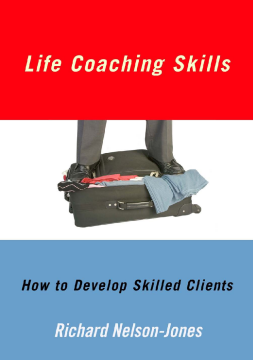
Additional Information
Book Details
Abstract
`Life Coaching Skills by Dr Richard Nelson-Jones is an excellent introduction to this rapidly expanding field of work. I can thoroughly recommend this book for both experienced and neophyte coaches. Practitioners from other professions and the layperson may also find the skills useful' - Professor Stephen Palmer, Coaching Psychology Unit, City University
`This book provides a wealth of information and expertise founded on tried and tested interventions and cannot fail to improve the skill level of existing coaches as well as those entering the Life Coaching arena' - Gladeana McMahon, Head of Coaching Fairplace plc, Co-Director, Centre for Coaching
Life coaching is a rapidly growing area with more and more people seeking help to lead satisfying and successful lives. Life Coaching Skills provides a practical introduction to the skills needed to be an effective life coach and incorporates a wide range of practical activities for coaches to use to help their clients develop self-coaching skills.
Written by leading skills expert, Richard Nelson-Jones, the book presents a four stage life coaching model based around the core concepts of relating, understanding, changing and client self-coaching. It explores the central skills of coaching used within the model including: establishing the coaching relationship; assessment and goal setting; presentation; demonstration, and consolidation.
The main focus of the book is on one-to-one life coaching particularly concerning relationship, work, and health issues. The specific skills needed for working with groups are also discussed and ethical issues and dilemmas related to coaching are explored. Life Coaching Skills is ideal for anyone interested in becoming a life coach and for use in training.
Table of Contents
| Section Title | Page | Action | Price |
|---|---|---|---|
| * Preface | |||
| Deborah Eade | |||
| * The depoliticisation of poverty | |||
| Firoze Manji | |||
| * The humanitarian responsibilities of the UN Security Council: ensuring the security of the people | |||
| Juan Somavia | |||
| * African rural labour and the World Bank: an alternative perspective | |||
| Deborah Fahy Bryceson and John Howe | |||
| * Empowerment and survival:humanitarian work in civil conflict | |||
| Martha Thompson | |||
| * The global struggle for the right to a place to live | |||
| Miloon Kothari | |||
| * Agrarian reform: a continuing imperative or an anachronism? | |||
| Cristina Liamzon | |||
| * The ethics of immigration controls: issues for development NGOs | |||
| Andy Storey | |||
| * The right to protection from sexual assault: the Indian anti-rape campaign | |||
| Geetanjali Gangoli | |||
| * Guatemala:uncovering the past, recovering the future | |||
| Elizabeth Lira | |||
| * Strengthening unions: the case of irrigated agriculture in the Brazilian north-east | |||
| Didier Bloch | |||
| * All rights guaranteed-all actors accountable: poverty is a violation of human rights | |||
| Grahame Russell | |||
| * Collective memory and the process of reconciliation and reconstruction | |||
| Wiseman Chirwa | |||
| * Devastation by leather tanneries in Tamil Nadu | |||
| John Paul Baskar | |||
| * Annotated bibliography | |||
| * Addresses of publishers and other organisations |
